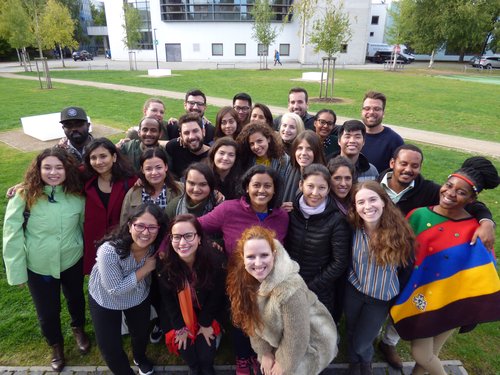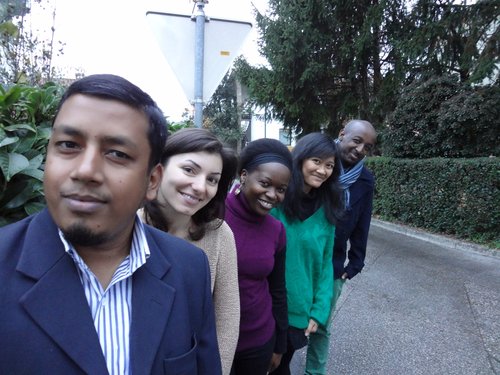European Master in Migration and Intercultural Relations (Erasmus Mundus)
| Study programme: | European Master in Migration and Intercultural Relations |
|---|---|
| Main fields of study: | migracijske študije, zgodovina, politologija, sociologija, antropologija, izobraževanje |
| Programme code: | 2MI1 |
| Programme cycle: | Second cycle master’s degree |
| Name of the qualification: | Postgraduate Masters degree |
| Qualification title: | Master of Arts in Migration and Intercultural Relations |
| Qualification abbreviation: | MA in Migration and Intercultural Relations |
| Final examination: | no |
| Dean: | prof. dr. Franc Marušič |
| Programme director: | prof. dr. Marina Lukšič Hacin |
| ECTS coordinator: | prof. dr. Iztok Arčon |
Programme description
International study programme European Masters and Migration and Intercultural Relations is the result of cooperation between European and African universities, led by the University of Oldenburg (Germany). In the academic year 2011/12 the program was first launched with the support of an elite program for international cooperation and exchange of students and professors in higher education, Erasmus Mundus.
The European Commission has recognized the program as a unique, mainly because of the interdisciplinary and intercultural perspective. The programme focuses on human rights, democratic values, the welfare state and labor market, the challenges facing the EU Member States and the wider global world.
Participating universities: University of Nova Gorica (Slovenia), University of Oldenburg (Germany), University of Stavanger (Norway), University of South Bohemia (Czech Republic), Ahfad University for Women (Sudan), University of the Witwatersrand, Johannesburg (South Africa) and Mbarara University of Science & Technology (Uganda).
Semester one will start in Oldenburg with a four weeks intensive phase focusing on overviews as well as exemplary approaches to key areas in migration studies and intercultural relations. The semester will continue with modules on transdisciplinary methods/methodology and theory. For semester two all students will move to Stavanger, they will contextualise their studies and furthermore concentrate on key areas and concepts. In their third semester students will work in thematic research teams as the frame and support structure for often individualised work in project based internships. Depending on their internship placement and/or the research focus module, students move on to another partner university: either in Europe or in Africa. For the fourth semester, supervision groups will be formed that attend the research colloquium at their selected partner university. Students will dedicate the fourth semester entirely to writing their thesis.
Admission requirements
As EMMIR is research oriented on one hand and well rooted in the field by its numerous associates on the other hand it attracts students seeking to persue an academic career and others looking for preparations to work in the field. In any case EMMIR is able to support and encourage students to professionalise.
Admission Requirements
- The programme builds upon a first degree such as a Bachelor's degree (or an equivalent qualification) in a field related to migration studies: e.g. Social sciences, History, Cultural studies, Educational sciences, Law, Economics, Development Studies and Journalism.
- The final grade of the first degree must be a minimum (or equivalent) of C+ and proven by certificates. You are expected to provide documentation of a final first degree by the deadline.
- Applicants have to document knowledge of migration studies, intercultural relations and empirical methods. Modules completed at the undergraduate level, papers, essays and examination results are considered valid documentation. Preference will also be given to qualified applicants who, in addition, have relevant professional experience.
- Language requirements: Applicants whose native language is not English or whose undergraduate instruction was not in English must demonstrate proficiency in English by the application deadline. We kindly ask you to check our website: www.emmir.org for more information about relevant tests of English language.
Applicants whose native language is English must demonstrate proficiency in a second language relevant to migration studies by the application deadline at a level corresponding to the list above.
Selection Process
Following application period, EMMIR Consortium Committee Selection Board will select students based on relevance and level of academic qualification, relevance and level of research/professional experience, motivation and proficiency in second/third language.
More information and application
Educational and professional goals
EMMIR responds to this rising importance by providing state of the art education in theoretical concepts, empirical methods and transdisciplinary approaches to migration studies. Teaching and research in EMMIR will address issues that currently rank highly on the global agenda - and need expertise on transnational, transcultural and transdisciplinary level. Migration and mobility, flight, displacement and refuge - globally and (supra)nationally discussed primarily on a policy level - touch decisive dimensions in economic and social development, demography, international relations, political theory and cultural cooperation, to name some, not all of the key areas. Sustainable answers bridging the interests of nation states (incl. their welfare systems and labour markets) with human rights, democratic values and globality have yet to be found. Research on intercultural relations and intercultural communication is closely linked to these questions and frequently key to the understanding of problems and conflict.
The curriculum takes into account all forms of migration and displacement. Related issues to be addressed are intercultural conflict resolution mechanisms, multi cultural governance issues and global/regional integration.
Access to further studies
After obtainingMaster's degree, candidates have the opportunity to continue studies in study programs leading to a doctorate, in accordance with entry requirements for the chosen program.
Obtaining theoretical, methodological and empirical knowledge with the emphasis on interdisciplinary and transcultural approaches to studying and understanding migration, will prepare students for employment in research organizations, governmental and non-governmental organizations responsible for migration and refugees, ieducational institutions, etc.
Courses refresh
1. year
Module MM11 Introduction to Migration Studies
| Compulsory courses | Hours | ECTS |
|---|---|---|
| German Language and Culture | - | 2 |
| Studying Global Migration in the 21st Century (Intensive phase) | - | 6 |
Module MM12 Evaluating and Developing Research Methods for Transcultural Contexts
| Compulsory courses | Hours | ECTS |
|---|---|---|
| Migration & Intercultural Relations: Disciplinary Perspectives – Theoretical Foundations | - | 4 |
| Research Methods for Transcultural Contexts | - | 10 |
Module MM13 Theorising Historical and Contemporary Migration Processes & Intercultural Relations
| Compulsory courses | Hours | ECTS |
|---|---|---|
| Global Migration – Contextualising African Migration | - | 3 |
| Historical Dimensions of Migration | - | 2 |
| Theorising Contemporary Migration & Intercultural Relations | - | 3 |
Module MM21 Emigration and Immigration: A Northern European Perspective
| Compulsory courses | Hours | ECTS |
|---|---|---|
| Norwegian Language and Culture | - | 2 |
| Scandinavia: Historical and Contemporary Migration | - | 10 |
Module MM22 Theorising Migration and Multiculturalism (The student selects 3 courses)
| General elective courses | Hours | ECTS |
|---|---|---|
| Citizenship, Multiculturalism and Education | 60 | 6 |
| Controversies over Multiculturalism | 60 | 6 |
| Migration and Integration | 60 | 6 |
| Migration, Borders and Citizenshi | 60 | 6 |
| Migration, Gender, Culture | 60 | 6 |
| Migration, Gender, Development: African Perspectives | - | 6 |
2. year
Module MM31 Project-based Internship (thematic research teams)
| Compulsory courses | Hours | ECTS |
|---|---|---|
| Project-based Internship (thematic research teams) | - | 14 |
Module MM32 Research Foci: Migration & Multicultural Societies
| General elective courses | Hours | ECTS |
|---|---|---|
| Development and Sustainability | - | 12 |
| Diversity and Education | - | 12 |
| Forced Migration, Gender and (Post-)Conflict | - | 12 |
| Gender, Identity and Multiculturalism | - | 12 |
| Migration and Small Nations / Cultural aspects of Slovenian Migration | - | 12 |
| Representation, Ethnicity and Nation State | - | 12 |
Module MM41 MA Dissertation
| Compulsory courses | Hours | ECTS |
|---|---|---|
| MA Dissertation - Dissertation and Research Colloquium | - | 30 |
| MA Dissertation - Proposal Colloquium | - | 4 |


